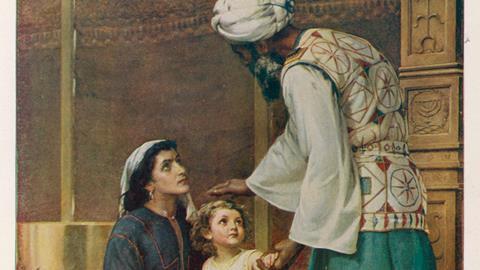Elaine Storkey unpacks three biblical characters’ stories to show that God has a heart for those cut off from their birth families
You don’t have to look far in the Bible to find God’s concern for vulnerable people. The Psalms, for example, share God’s involvement with those orphaned. In Psalm 10, we’re told that God is their helper and defender, hearing their cries (vv14, 17-18). In Psalm 146:9, God watches over orphans and sustains them. In Psalm 82:3, God instructs us to defend them, and uphold their cause. In Psalm 68:5 God is even described as “father to the fatherless”.
Children without fathers were very vulnerable in ancient times; in the Hebrew scriptures we find more than 40 references to them (eg Exodus 22:22, Isaiah 1:17). Not only in the Psalms do we get an insight into God’s protection and provision for orphans. His heart for those cut off from birth families runs through the Bible.
Adoption stories in the Bible
In the Old Testament, God’s people were constantly asked to reflect God’s care in their own relationships with the fatherless, so adoption and fostering would have been common. We don’t find adoption laws in the Mosaic law, because it took place largely within the kinship network, as the need arose. But we do have stories of people who were adopted. Three stories are quite dramatic and have extraordinary outcomes. Moses, Esther and Samuel became key characters in the history of Israel, and the fact that they were adopted had huge significance for their lives. Their stories also tell us a great deal about the impact that parents and other people had on their lives.
The story of Moses is well known (Exodus 2). He was a child of the diaspora: Jews living in Egypt. His parents were alive, so he had no need of adoption, yet his own life was in danger. His mother and sister hid him in the bullrushes in the river Nile, to escape the Pharoah’s edict that Jewish male babies should be annihilated. But Pharoah’s daughter, going to the river to bathe, saw the baby and took him out of danger to her own home. This was an adoption of compassion and rescue, made even more poignant by the fact that he was then nursed by his mother; the quick-witted offer of a Hebrew wet-nurse by his sister to Pharoah’s daughter ensured that she could stay involved. So, despite his Jewish identity, Moses became a prince of Egypt, until he killed an Egyptian torturing a Hebrew man and fled. The narrative of his life had many twists and turns, but God preserved him for his calling to become the liberator of the Jewish people from Egypt.
The story of Esther has both similarities and differences (Esther 2:5-23). She too was a Jewish child in the diaspora, this time in Persia. Her adoption was far more typical than that of Moses because her parents had died. She was adopted by an older cousin, Mordecai, a wise, loving and gentle man who put her needs very high on his list of priorities. The Bible portrays him as a man of faith and integrity, and he raised Esther in the same faith, guiding her decisions. Again, in a gripping narrative, Esther entered the Persian court and won the favour of the king, but, under Mordecai’s advice, kept her Jewish identity a secret. Then, as queen of Persia, she was able to save her husband’s life, after Mordecai overheard an assassination plot. Eventually, through very careful strategy, she saved her adopted father’s life too, and she and Mordecai eventually overturned the schemes of ruthless enemies to save the Hebrew people from extermination.
Our third example is not of adoption but of a foster child. Samuel was the firstborn of Hannah, who pleaded with God for a baby (1 Samuel 1:1-28), promising that if her prayer was answered, she would ensure he was brought up in God’s service. Eli the priest witnessed her prayer, although he had no idea what she was asking and initially thought she was drunk. So we can imagine his surprise many years later when, aged around five, Samuel was brought to him. His mother was keeping her promise that Samuel would be nurtured in the temple as God’s servant. To us it seems an extraordinary arrangement! Yet Eli was a loving and caring foster father and bestowed love and consideration on the child. His close, gentle relationship with the dutiful Samuel was also a comfort to him, in marked contrast to that with his other wayward sons. Eli taught Samuel to hear God’s voice and receive the gift of discernment, and through his consistent spiritual guidance and upbringing, Samuel eventually became a key prophet in Israel.
Lessons from these stories
These are three very different biblical narratives about fostering and adoption in times long past. Yet they still have significant things to teach us. The first is the vulnerability of the adopted child. Whether because of parental loss, ethnic cleansing or questions of identity, the children were at risk in many ways. And in none of these cases did the infant have any say in their own future. That was decided for them by adults. This emphasises the huge responsibility God places on those making the decisions; they have to be made in truth, love and faithfulness to the child whose life is in their hands.
The second thing is the level of commitment needed by the adoptive parent. Pharoah’s daughter had all the financial resources she could need, but she also needed to provide closeness and bonding to the tiny infant. It was wonderful that she agreed to share her parenting with a woman (unbeknown to her) who had so much love to give. Eli had few resources for rearing a child, as his life circulated round the temple. But he gave him love, wisdom and spiritual care, and that was Samuel needed. Mordecai can hardly have been over resourced, faced as he was with the prospect of nurturing and shielding a very attractive young girl. Yet he ensured she was kept safe and developed all the wisdom and resources he needed to be a caring and protective father. Adoption required time, commitment, care and love from each of them.
God is a father to the fatherless
The final point is that adoption places someone as spiritual guardian and teacher in the child’s life. Moses, Esther and Samuel all were called by God to be his servants and carry out his will; they were destined for significant roles in the history of the Hebrew people. And for this, they needed parents who would teach, inspire and release them into creative adulthood, sometimes through self-sacrifice. Pharoah’s daughter provided this parenting by allowing Moses to be nurtured by a Jewish woman, Hannah by letting Samuel go and Mordecai by giving Esther time, showing her how to keep the faith. When faith and trust in God is seeded into a child’s life, we can trust that child to the future.
How does this relate to adoption and fostering today?
In our different era and cultural climate most of us don’t have to struggle with the issues people faced in the Hebrew scriptures. But care for those orphaned or in need of parents remains an ongoing requirement for Christians. In his letter to the early Church, the apostle James echoes this when he urges us to put our faith into practice: “Religion that our Father accepts as pure and faultless is this: to look after orphans and widows in their distress and to keep oneself from being polluted by the world” (James 1:27). How does the world pollute us? By encouraging us to be self-centred and indifferent to the needs of others – including those longing to belong.
Every year in the UK tens of thousands of children face crisis and enter the care sector of our society. They may be victims of abuse, neglect or separation; perhaps living with parents unable to care for them through instability, drug abuse or mental health problems. They may simply be orphaned, with no family member to provide the home they now need. Christians have felt called both to foster vulnerable children and explore becoming adoptive parents. These are massive undertakings, requiring much commitment and change, but for those led by God to take such steps, crucial vocations.
The importance God gives to adoption is underscored in the New Testament. For it’s the word used to describe God’s relationship with us. In Romans 8:15-16 Paul writes that we have received “a spirit of adoption as sons and daughters, by which we cry, out ‘Abba! Father!’” (NASB). Galatians 4:6 echoes this: “God sent the Spirit of his Son into our hearts, the Spirit who calls out, ‘Abba! Father!’” Adoption is the new status we have in Christ, where God lavishes his fatherly love on us. Let’s share that love with those who desperately need it.


































No comments yet